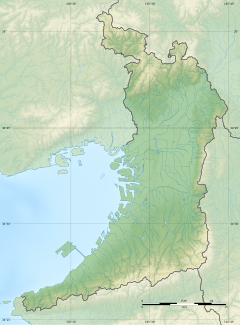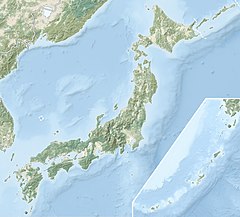Asada Domain
| Asada Domain 麻田藩 | |
|---|---|
| Domain of Japan | |
| 1615–1871 | |
| Capital | Asada jin'ya |
| Area | |
| • Coordinates | 34°47′38.41″N 135°26′55.01″E / 34.7940028°N 135.4486139°E |
| Historical era | Edo period |
• Established | 1615 |
| 1871 | |
| Contained within | |
| • Province | Settsu Province |
| Today part of | Osaka Prefecture |

Asada Domain (麻田藩, Asada-han) was a feudal domain under the Tokugawa shogunate of Edo period Japan, in what is now northern Osaka Prefecture. It was located in Teshima and Kawabe Districts of Settsu Province and was centered around Asada jin'ya in what is now part of the city of Toyonaka, Osaka. It was ruled in its entire history by a branch of the Aoki clan. Asada Domain was dissolved in the abolition of the han system in 1871 and is now part of Okayama Prefecture.[1][2][3]
History
[edit]Asada Domain was founded by Aoki Kazushige, whose father Aoki Shigenao had served as a vassal of Toki Yorinari, the shugo of Mino Province in the Sengoku period. Aoki Kazushige later went into the service of the Imagawa clan, and after the Battle of Okehazama, entered the service of Tokugawa Ieyasu. After this younger brother died at the Battle of Shizugatake, he ran away from the Tokugawa clan and became a vassal of Nawa Nagahide instead. He entered the service of Toyotomi Hideyoshi on Nawa Nagahide's death. During the Siege of Osaka in 1614, he was sent by Toyotomi Hideyori as a messenger to Sunpu for peace negotiations, but was detained in Kyoto and made a prisoner of war. However, after the success of Tokugawa forces over the Toyotomi clan, he was awarded with territories in Settsu, Bitchū and Iyo Province with a kokudaka of 14,000 koku and made a daimyō. The domain remained under the rule of the Aoki clan until the Meiji era; however, it was reduced to 12,000 koku in 1617 when Aoki Kazushige established his younger brother Aoki Kanao as a 2000 koku hatamoto and head of a cadet branch of the clan. In 1619, he adopted Kanao's son Shigekane as his successor. In 1926, the territories of the domain Iyo were traded for territories in Settsu to consolidated the domain's holdings. Shigekane had only a daughter, so he adopted a son of the Sakai clan as his heir. Aoki Shigemasa was close confidant of Shogun Tokugawa Tsunayoshi, and before his death in 1693, the Shogun despatched his person physician as a mark of favor.
In the mid-Edo period, but the clan's finances were in difficulties due to the construction of the Ōbaku School temple of Bussunichi-ji Temple during the Kanbun era. Measures encouraging the production of sake and oil as clan monopolies, and issuing han bills were ineffective. Following the Meiji restoration, Asada Domain became "Asada Prefecture" with the abolition of the han system in 1871, and was subsequently incorporated into Osaka Prefecture. The Aoki clan was awarded the rank of viscount (shishaku) in the kazoku peerage in 1884.
The site of the jin'ya was the former Hotarugaike Public Hall on the west side of Hankyu Takarazuka Main Line Hotarugaike Station. It is designated as a Toyonaka city historic site, but there is no remnant of the former structure, and stone monument has been erected in one corner of the site public hall.
Holdings at the end of the Edo period
[edit]As with most domains in the han system, Asada Domain consisted of several discontinuous territories calculated to provide the assigned kokudaka, based on periodic cadastral surveys and projected agricultural yields, g.[4][5]
- Settsu Province
- 15 villages in Teshima District
- 13 villages in Kawabe District
- Bitchū Province
- 2 villages in Oda District
- 6 villages in Shitsuki District
- 3 villages in Asakuchi District
List of daimyō
[edit]# Name Tenure Courtesy title Court Rank kokudaka  Aoki clan, 1615-1871 (Tozama)
Aoki clan, 1615-1871 (Tozama)
1 Aoki Kazushige (青木一重) 1614 - 1619 Minbu-shōfu (民部少輔) Junior 5th Rank, Lower Grade (従五位下) 14,000 ->12,000 koku 2 Aoki Shigekane (青木重兼) 1619 - 1672 Kai-no-kami (甲斐守) Junior 5th Rank, Lower Grade (従五位下) 12,000 koku 3 Aoki Shigemasa (青木重正) 1672 - 1693 Kai-no-kami (甲斐守) Junior 5th Rank, Lower Grade (従五位下) 12,000 koku 4 Aoki Shigenori (青木重矩) 1693 - 1713 Kai-no-kami (甲斐守) Junior 5th Rank, Lower Grade (従五位下) 12,000 koku 5 Aoki Kazutsune (青木一典) 1713 - 1736 Kai-no-kami (甲斐守) Junior 5th Rank, Lower Grade (従五位下) 12,000 koku 6 Aoki Kazukuni (青木一都) 1736 - 1749 Dewa-no-kami (出羽守) Junior 5th Rank, Lower Grade (従五位下) 112,000 koku 7 Aoki Chikatsune (青木見典) 1749 - 1754 Naizen-no-kami (内膳正) Junior 5th Rank, Lower Grade (従五位下) 12,000 koku 8 Aoki Kazuyoshi (青木一新) 1754 - 1770 Mimasaka-no-kami (美濃守) Junior 5th Rank, Lower Grade (従五位下) 12,000 koku 9 Aoki Kazutsura (青木一貫) 1770 - 1786 Kai-no-kami (甲斐守) Junior 5th Rank, Lower Grade (従五位下) 12,000 koku 10 Aoki Kazusada (青木一貞) 1786 - 1821 Kai-no-kami (甲斐守) Junior 5th Rank, Lower Grade (従五位下) 12,000 koku 11 Aoki Shigetatsu (青木重龍) 1821 - 1847 Suruga-no-kami (駿河守) Junior 5th Rank, Lower Grade (従五位下) 12,000 koku 12 Aoki Kazuoki (青木一興) 1847 - 1849 Mino-no-kami (美濃守) Junior 5th Rank, Lower Grade (従五位下) 12,000 koku 13 Aoki Kazuhiro (青木一咸) 1849 - 1856 Kai-no-kami (甲斐守) Junior 5th Rank, Lower Grade (従五位下) 12,000 koku 14 Aoki Kazuyoshi (青木重義) 1856 - 1871 Minbu-shōfu (民部少輔) Junior 5th Rank, Lower Grade (従五位下) 12,000 koku
See also
[edit]References
[edit]- (in Japanese) Genealogy of the lords of Asada Archived 2016-03-03 at the Wayback Machine
- ^ Nakayama, Yoshiaki (2015). 江戸三百藩大全 全藩藩主変遷表付. Kosaido Publishing. ISBN 978-4331802946.(in Japanese)
- ^ Nigi, Kenichi (2004). 藩と城下町の事典―国別. Tokyodo Printing. ISBN 978-4490106510.
- ^ Papinot, E (1910). Historical and Geographic Dictionary of Japan. Tuttle (reprint) 1972.
- ^ Mass, Jeffrey P. and William B. Hauser. (1987). The Bakufu in Japanese History, p. 150.
- ^ Elison, George and Bardwell L. Smith (1987). Warlords, Artists, & Commoners: Japan in the Sixteenth Century, p. 18.



